






The iconic red tractor, the Farmall, celebrates its 100th anniversary this year.
Twenty-five farmers and sheller representatives of PLA Class XII graduate at a ceremony in Tennessee.
The USA Peanut Congress held in June brought together the industry to make decisions and present awards.
The National Peanut Board brought school nutrition leaders together for a summit focused on ways to utilize peanuts in school systems.
July/August 2023 | Peanut Harvest Guidebook

Alabama Peanut Producers Association
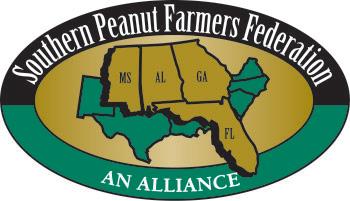
Florida Peanut Producers Association
The 2023 Peanut Harvest Guidebook features key tips for equipment maintenance, as well as information about pod blast sampling and determing when to dig.

Hamilton Halford, Perry, Ga.; Randy Bodine, Auburn, Ala.; Sonny and Paul Stapleton, Weston, Ga., became life-long friends through their love of Farmall tractors. Photo by Maddie Frost.
Southeastern Peanut Farmer is published six times a year (Jan./Feb., March, April, May/June, July/Aug., and Oct./Nov.) by the Southern Peanut Farmers Federation. The publisher is not responsible for copy omission, typographical errors, or any unintentional errors that may occur, other than to correct it in the following issue. Any erroneous reflection which may occur in the columns of Southeastern Peanut Farmer will be corrected upon brought to the attention of the editor. (Phone 229-386-3690.)

Postmaster: Send address changes (Form 3579) to Southeastern Peanut Farmer, P.O. Box 706, Tifton, Georgia, 31793.
Circulation is free to qualified peanut growers and others allied to the industry. Periodical postage paid at Tifton, Georgia and additional mailing office.
Editorial Content: Editorial copy from sources outside of the Southern Peanut Farmers Federation is sometimes presented for the information and interest of our members. Such material may, or may not, coincide with official Southern Peanut Farmers Federation policies. Publication of material does not necessarily imply its endorsement by the Southern Peanut Farmers Federation. For editorial concerns call 229-386-3690. No portion of this or past issues of the Southeastern Peanut Farmer may be reproduced in any form whatsoever without the written consent of the editor. By-lined articles appearing in this publication represent views of the authors and not necessarily those of the publisher. Advertising: The Publisher reserves the right to refuse any advertisement. Corrections to advertisements must be made after the first run. All billing offers subject to credit review. Advertisements contained in this publication do not represent an endorsement by the Southeastern Peanut Farmer or the Southern Peanut Farmers Federation. Use of trade names in this publication is for the purpose of providing
named. For advertising concerns call 229-386-3472.
2023 | Southeastern Peanut Farmer
Seems like peanuts were just planted and now it is time to begin preparing for harvest. This issue highlights some tips farmers can take now to prepare for the upcoming harvest. Some of those tips include equipment maintenance prior to harvest on your digger and combine. By taking time now to prepare, farmers can be ready to harvest their peanut crop.
Also, by preparing in advance, farmers will be able to secure any parts needed, replace parts or make updates to equipment they have. The 2023 SEPF’s Harvest Guidebook provides you with the information you need to prepare for harvest. In addition to equipment maintenance, the state agronomists provide some tips on determining when to dig and steps you can take in making sure your peanuts are ready for harvest.
This year Case IH is celebrating the 100th anniversary of the Farmall tractor. The iconic red tractor has been loved by many generations including myself. I have memories of our Farmall Super A growing up on the farm where I used the Super A to plant the garden and for other uses on the farm.
Like many old tractors, some have found themselves in disarray while others are remodeled. Today, there are many events like tractor shows, museums and farm shows where farmers or tractor lovers can showcase their refurbished tractors and ride them in antique tractor parades. So, whether you have a love for the red, blue or green tractors or a love for all tractors, then be sure to read the story on page 6 about the 100th anniversary of the Farmall tractor and how the love for tractors brought together four farmers who share a love for antique tractors.
In honor of the 100th milestone, Case IH will give a new Farmall 75C tractor to one individual who shares how Farmall has helped shape their farm over the years or how it’s become part of the family. The contest, launched in February 2023, ends Oct. 30, 2023. For official details and to enter the contest visit farmall100.com. The winner will be announced during the National FFA Convention in November.
Lastly, this issue highlights the recent Class XII graduates of the Peanut Leadership Academy. There were 25 farmers and sheller representatives who graduated at their final session in Tennessee. Check out this story on page 14. Applications are also available for those interested in applying for Class XIII at southernpeanutfarmers.org. The twoyear program allows farmers and sheller representatives the ability to learn more about the peanut industry, communication and media interview skills, legislative issues and more.
I hope all of you have a bountiful harvest this fall!
Carter Crosby SEPF EditorCotton & Peanut Field Day
Sept. 6, 2023, Tifton, Ga. For more information call 229-386-3366.
Georgia Peanut Tour
Sept. 12-14, 2023, Bainbridge, Ga. For more information call 229-386-3470 or visit georgiapeanuttour.com.
Brooklet Peanut Festival
Sept. 16, 2023, Brooklet, Ga. For more information visit the festival's website at brookletpeanutfestival.com.
Tri-State Disease Tour
Sept. 19-21, 2023, Tifton, Ga.; Headland, Ala. and Marianna, Fla. For more information email spotwilt@uga.edu.
Plains Peanut Festival
Sept. 23, 2023, Plains, Ga. For more information call visit the festival's website at jimmycarterfriends.org.
Georgia National Fair
Oct. 5-15, 2023, Perry, Ga. For more info visit georgianationalfair.com.
Sunbelt Ag Expo
Oct. 17-19, 2023, Moultrie, Ga. For more info call 229-985-1968 or visit the Expo's website at sunbeltexpo.com.
Florida Farm Bureau Annual Meeting

Oct. 25-27, 2023, Orlando, Fla. For more information visit floridafarmbureau.org.
National Peanut Festival
Nov. 3-12, 2023, Dothan, Ala. For more info visit the website at nationalpeanutfestival.com.
Georgia Farm Bureau Annual Meeting
Dec. 3-5, 2023, Jekyll Island, Ga. For more information visit gfb.org.
Alabama Farmers Federation Annual Meeting
Dec. 3-5, 2023. For more information visit alfafarmers.org.
Let us know about your event. Please send details to the editor at joycrosby@gapeanuts.com.
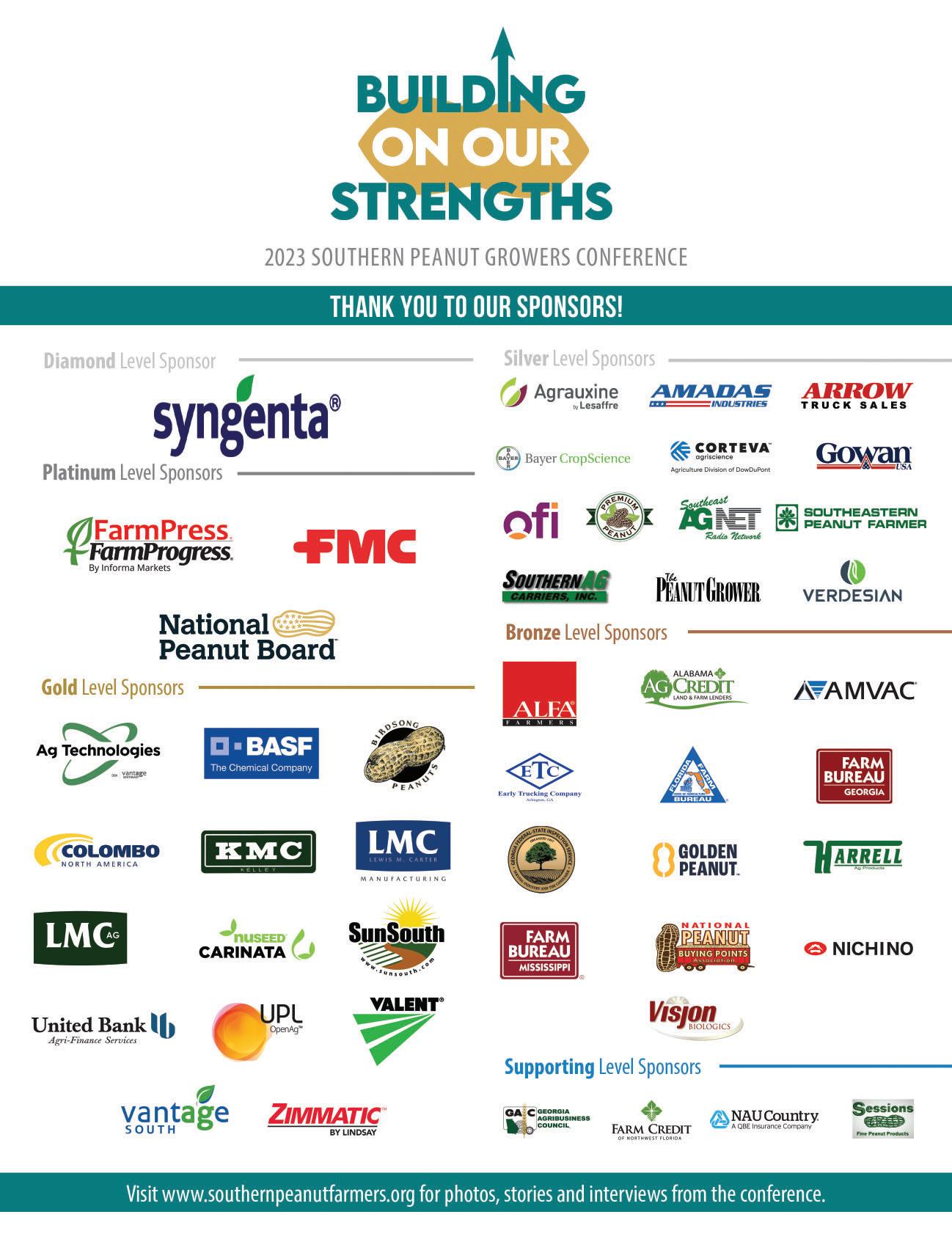
 by Maddie Frost
by Maddie Frost
Love for red tractors, collecting antique tractors, agriculture and more has bonded farmers across the United States. This love is intensified through the iconic Farmall model, which was introduced in 1923 as the all-purpose tractor designed to revolutionize the agricultural industry. Case IH is celebrating the 100-year anniversary of the Farmall tractor in 2023, and to remember the legacy, take a trip down memory lane.
International Harvester engineer Bert R. Benjamin had a vision for a tractor that could do it all and replace horses. His vision led to a revolutionary design that changed farming forever. The first Farmall prototype was handbuilt in 1923. The following year, the first Farmall tractor was built and sold for $950. By 1930, 200 Farmall tractors are rolling off the Rock Island, Illinois, production line every day.
In the 1930s, the iconic NO. 50 Motor Red and International Harvester branding began. This red color made its mark with Farmall tractors and continues to make its mark in agricultural history. In 1939, International Harvester, now operated as Case IH, introduced the secondgeneration Farmall tractor with the famous letter series, which includes small size tractors A and B, middlesized tractor H and large-sized tractor M. Before the last Farmall H tractor rolled off the line, more than 390,000 tractors were produced, making it one of the most popular row-crop tractor models in history.
In 1947, the Super Series made their appearance with the Super A, followed by the Super C in 1951, Super M in 1952 and the Super H in 1953. This series of tractors featured a quickconnect two-point hydraulic hitch system with implements to match. By 1954, the number system for Farmall is introduced, where Super A and Super
C tractors became 100 and 200 series tractors.
The Farmall 560 tractor is one of the most popular models sold after its release in the United States, while the Farmall 1206 tractor is the first row crop tractor with over 100 horsepower, making it arguably the world's most powerful and toughest all-purpose tractor of this era.
The Farmall 706 and 806 tractors make their debut in 1963. The 706 boasts a new transmission that has a four-speed main box and a twospeed range box, an optional torque amplifier (TA) that can move between gears without a clutch, power steering and a hydraulically actuated PTO. With all these upgrades, the 706 is an instant Farmall favorite.
The year 1974 was a big milestone
for Farmall when the company produced their 5 millionth tractor, the Farmall 1066 Turbo, in Rock Island. Case IH is the first tractor manufacturer to officially produce past this threshold.
Production then slowed down drastically, but in 2003, Farmall picked up right where they left off and the Farmall tractor was brought back to life. A series of compact tractors were created to assist smaller farms and residential acreage. In 2012, the Farmall A, B and C series tractors were brought back to life. These tractors were equipped with modern technology to assist the needs of a new generation of farmers.
Now in 2023, Case IH is celebrating the 100th anniversary of the Farmall tractor. More than 30
models, ranging from the compact series to the 100A series; the Farmall tractor is still designed to be versatile, powerful and productive.
Farmall’s rich history stretches far and wide, deeply rooted in their red color and various models. Those qualities brought these friends together, Sonny and Paul Stapleton from Weston, Georgia; Randy Bodine from Auburn, Alabama; and Hamilton Halford from Perry, Georgia. These friends, all from the Southeast, created a bond over antique tractor collecting. They met through what they referred to as a “disease.”
“That disease being a passion for tractor collecting, because once you start, you can’t stop,” Bodine says. “The only cure for the disease is to go buy another tractor.”
Sonny Stapleton, a retired farmer, is the perfect example of a Farmall collector. Stapleton has collected his tractors since the late '80s. The rest of the friend group then followed with their collection of tractors. Stapleton, Bodine and Halford all agree it isn’t about when they started collecting, rather when they first became involved with tractors.
Bodine, a seventh-generation farmer, recalls how his great grandfather made the transition from mule to tractor. His father then followed and Bodine was next in line. Bodine remembers his time on tractors from a very young age of seven. He spent time with his father planting crops and was inspired by his love for Farmall tractors.
The Bodine brothers started collecting tractors before they even realized they could be known as collectors. Bodine recalls visiting a tractor show 30 years ago and meeting some older men who had two or three tractors in the show and were known as collectors.
“Following the meeting we started talking about the collectors we met that only had a handful of tractors so based on the number of tractors we had at the time, we could also be collectors,” Bodine says. “Our collection has only grown through the years which now includes multiple
antique tractors.”
Sonny Stapleton’s story is very similar. His love for tractors started at a very young age with a Farmall Regular tractor his father owned. Over the years Stapleton’s father purchased a Farmall A, which was a small-sized tractor, and a Farmall M, which was a large-sized tractor.
“I was crazy about tractors; all I wanted was to drive daddy’s tractors,” Sonny Stapleton says.
Halford’s love for Farmall tractors started early in his family tree, since his great-grandfather worked for Case IH in Chicago. In 2005, he even purchased a Farmall M, which was his first Farmall purchase. Although his love for tractors favored the green color, the love was still all the same for Farmall.
A passion for agriculture, tractors and the Farmall brand ran in the blood of these men and bonded their friendship. Their passion for preserving antique tractors has taken them across the United States.
Bodine has had the opportunity to drive one of the tractors from his collection across the five-mile Mackinac Bridge in Michigan.
Hamilton has been able to showcase his collection at events
such as the Florida Flywheelers show, located in Fort Meade, Florida.
Through the years, Sonny and Paul Stapleton have displayed their antique tractors and peanut harvesting equipment at a demonstration in the early 2000s at their farm.

These men met due to preserving integral parts of agricultural history through their collection of antique tractors. No matter how far they travel or how long they are gone, their heart will always lie in their collections at home, and in the friendships they have made along the way.
For more information on the yearlong celebration of the 100th anniversary of Farmall and the contest details of a Farmall tractor, visit Farmall100.com.


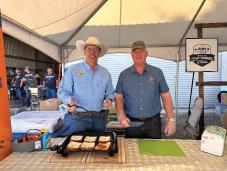
The 22nd annual Suwannee CARES Celebration, held May 2, 2023, was a huge success. This event offers a time to recognize farmers and ranchers committed to environmental stewardship. During the event, the Florida Peanut Producers Association served 400 of the farmer's favorite grilled peanut butter and jelly sandwiches. Since 2001, the Suwannee River Partnership, in cooperation with multiple agricultural organizations and agencies, has hosted the Suwannee CARES Celebration in Live Oak, Florida. More than 600 families and community members gather to recognize farmers and ranchers from the 16 counties inside the Suwannee River Basin who demonstrate outstanding environmental stewardship.
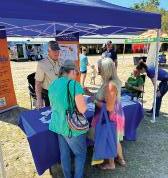
The Florida Peanut Producers Association attended the first Family Farm Festival at the Florida Agricultural Museum in April. This was an educational event open to the public. During the event, there were many interactive activities and many hands-on educational stations about Florida agriculture. The event was an excellent opportunity for many different entities within agriculture to come together and show how Florida farmers take care of the environment while providing a safe, affordable and abundant food supply.
The festival was presented by Flagler County Farm Bureau, UF/IFAS Extension and Florida Ag in the Classroom.

The Alabama Peanut Producers Association partnered with The Peanut Institute to set up an exhibit at minor league baseball games


throughout May and June, promoting the sport’s most popular snack. The Birmingham Barons game, attended on May 13, included peanut giveaways and the honorary first pitch, as well as advertising among drink rails. The Montgomery Biscuits game on June 4, featured APPA’s logo on a pillow giveaway to the crowd and announcements made throughout the game. Both games featured new banners designed specifically for baseball. The Huntsville Trash Pandas baseballl team also featured APPA’s logo and advertisement throughout the season in their program.
Three new staff members joined the Georgia Peanut Commission team in 2023. Sara Ott, joined the team in February as the gift shop clerk, Maddie Frost joined the team in May as the project coordinator for farm and field services and David West joined the team in July as the project coordinator for research and education.
Ott brings eight years of experience in retail sales from Moultrie, Georgia. She is responsible for the Georgia Peanuts gift shop and greets visitors as they enter the headquarters in Tifton, Georgia.


Frost graduated with a bachelor's degree in agricultural communications from Abraham Baldwin Agricultural College this past spring. She has a passion for agriculture and advocating for farmers. She has a previous history with the Georgia Peanut Commission as the communications intern, and following graduation, received a fulltime position. Frost is excited about this endeavor and looks forward to working in the peanut industry.
West previously served as the Georgia Young Farmer advisor in Dooly County, Georgia, where he provided educational classes and leadership development to the agricultural and agribusiness community. West received a bachelor's degree, master’s degree and doctorate of education in educational leadership from the University of Georgia. West understands the importance of peanuts to Georgia agriculture and looks forward to continued service for Georgia's peanut producers.

Peanuts were promoted in Alabama, Florida and Mississippi at the state welcome centers during National Tourism Day by the state checkoff organizations.
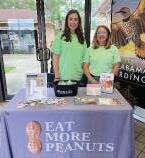

Kaye Lynn Hataway and Kaycee Rippey traveled to the Alabama state line to celebrate National Tourism Day with the Houston County Welcome Center. There were more than 300 travelers from about 17 states who stopped by the Welcome Center. The event featured peanut pack giveaways, along with other food and commodities, to highlight the Peanut Capital of the World for incoming travelers. The other seven welcome centers around the state offered Alabama peanuts to visitors during their tourism day celebrations as well.
Florida is known for white sandy beaches, blue water and Mickey Mouse. The state is also known for its variety of agriculture including approximately 175,000 acres of peanuts planted in 2023. To highlight this, Florida Peanut Producers participated in Florida Tourism Week at the Florida Welcome Centers. FPPA provided visitors traveling through Florida with roasted salted Florida peanuts and educational brochures.
The Mississippi Peanut Growers Association set up an exhibit at the Mississippi Visitors Center on Interstate 59 North, across the Louisiana state line from New Orleans. More than 100 visitors stopped by during the one-day event, picking up peanut educational information, free peanuts and asking questions about the peanut industry. During the event Malcolm Broome, MPGA executive director, shared peanut information regarding how peanuts grow and the nutritional value of eating peanuts. Broome visited with tourists traveling from across the U.S., England and Germany.
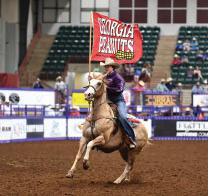
Georgia Peanuts were promoted during the National Junior High Finals Rodeo held at the Georgia National Fairgrounds in Perry, Georgia, June 18-24, 2023. The seven-day event brought nearly 65,000 visitors to middle Georgia. The National High School Rodeo Association is one of the largest youth organizations in the western industry with an annual membership of 12,000 students from 44 states, five Canadian provinces, Mexico, Australia and New Zealand. More than 1,200 junior high school contestants competed for the National Champion title during the rodeo finals. Each exhibitor received a pack of Georgia Peanuts in their welcome bag. Also, Georgia Peanuts were promoted in the program booklet at the event and throughout opening ceremonies of rodeo events throughout the week.
After the recent deadly tornado outbreak across Mississippi, MPGA donated two pallets of peanut butter along with other donors through Peanut Proud. The peanut butter shipment included eight pallets totaling 11,520 jars delivered by Southern Ag. A special thanks is due to Peanut Proud and Southern Ag for making this very nutritious food source available to many people during this disaster.

The Georgia Peanut Commission sponsored a Capstone project with a team of senior University of Engineering students. The team developed a small scale, on-site peanut processing system which produces peanut butter. The system can be adapted to produce various peanut products allowing farmers the opportunity to produce market-ready products for the consumer. Students worked on their Capstone projects from September 2022 until April 2023.
Each year, College of Engineering Capstone Design students present at the Capstone Design Showcase, displaying their prototypes, designs and solutions developed for their projects. During the event, projects are evaluated by a judging team comprised of engineering professionals in both industry and academia. The peanut processing system team received first place honors in the Manufactured System or Process Design at the 2023 Capstone Design Showcase.
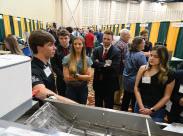
 By Joy Crosby
By Joy Crosby
Issues with seed vigor, weather conditions at planting, continued rains, colder temperatures and crop damage from deer or other wildlife have all caused a delay in the 2023 peanut crop. However, the crop is rebounding, according to peanut agronomists, but more than likely the Southeast will see a delayed harvest.
"In times like this, it is critical for farmers to begin checking their crop at 120 days even though we could be looking at 150 days maturity instead of the normal 140 days," says Scott Monfort, University of Georgia Extension peanut agronomist.
Monfort is conducting a digging date study this year on multiple varieties to see if the maturity is still similar as previous years. If a farmer's main way of determining maturity is days after planting then this is not what a farmer will want to do this year, Monfort adds.
"Farmers need to be more dialed in this year with crop maturity especially with planting, blooming and accumulated heat units being behind," Monfort says.
Farmers are encouraged to take a sample representative of the entire field. Agronomists agree the sample needs to come from an area representative of the majority of the field and the soil type within the field. If the sample is not representative of the entire field, a farmer will wind up overestimating or underestimating the crop maturity.
Monfort recommends sampling two foot of row out of five different places within the field. He discourages a farmer from obtaining a sample right at the pivot point or the edge of the field.
The Extension offices across the
Southeast hold pod blasting clinics in county offices or regional areas for farmers to attend and bring samples. It is important for farmers to bring the entire sample, including the vines to the pod blasting clinic instead of pulling the peanuts off of the vine in advance.
"By allowing the Extension agents to see the entire vine, they can make a better decision to help farmers; especially if a farmer is having issues with disease and needs to go ahead and dig the crop up," Monfort says.
Hurricanes are also another consideration during harvest. If a farmer has peanuts ready to harvest and a hurricane is coming, Monfort recommends not digging too far before the hurricane. If a farmer digs peanuts too far ahead of the weather event and can't harvest them, then the vines will get brittle and a farmer will have more loss when trying to pick the peanuts. Monfort recommends digging a day or so before the hurricane so the vines do not get brittle. Of course, he says, a farmer will have to fluff the vines before picking.
"It is always better to have rain on freshly dug peanuts than peanuts that have already dried in the field, causing the vines to get brittle,"
Monfort says.
Research through the years has shown that by digging too early or too late, a farmer can risk losing 500 to 1,000 pounds per acre. Once past two weeks of maturity, if the crop has been impacted from disease, peg strength or other issues, a grower could see upwards of 1,000 to 1,500 pounds per acre.
Kris Balkcom, Auburn University Extension peanut specialist, encourages farmers to plan for increased picking capacity for the 2023 crop.
"The crop has been delayed this year and most likely we could see harvest going later into November, which means wetter weather patterns, cooler temperatures and shorter days," Balkcom says. "Farmers should consider additional pickers or ways to work together with other farmers to be able to get across that crop faster."
Even with the delays and unpredictability of the 2023 season, farmers can stay prepared and ahead of the game by monitoring their field, taking a representative sample of their field for pod blasting and making informed decisions when it comes to digging and picking.

Proper equipment maintenance is key in having an almost trouble free harvest with peanuts. Of course, there can be equipment malfunctions once harvest begins, but taking the time to check equipment prior to harvest and replacing worn out parts will help relieve some stress at the beginning of harvest time.
"Since the peanut crop is going to be extended this year a little bit, farmers have a little more lead time into getting their equipment ready for harvest," says Scott Monfort, University of Georgia Extension peanut agronomist. "Once in the field, farmers should pay attention to detail and readjust as needed based on weather conditions."
Mississippi peanut agronomist Brendan Zurweller, encourages farmers to look through their digger and make sure they have fresh
By Joy Crosbyblades, check the belts and pulleys. Additionally, he encourages farmers to get parts greased up and check the tire pressure on their equipment.
Many farmers faced issues in 2022 with parts supply at harvest time.
"I hope we've got the parts supply stocked up for 2023, because we were short-handed last year, which had many farmers in a bind by not being able to get their hands on some of the parts they needed," says Kris Balkcom, Auburn University peanut specialist. "Harvest time is very important and a critical time trying to get the crop out in a timely manner."
In some cases, farmers may be interested in updating their equipment for 2023. If a farmer is running a PTO drive, it is hard to really dial in their speed, so Monfort recommends converting to a hydraulic system. However, Monfort adds, even
if a farmer makes the change to a hydraulic system that doesn't mean they can speed up at digging.
"With peanuts, there is a certain speed that is more conducive to making good windrows and not pulling peanuts off the vine while digging," Monfort says. "The new hydraulics makes things a lot more streamlined when digging."
It's easier to repair and replace parts prior to harvest. While in the field, all agronomists agree that if farmers don’t monitor their settings, they could see more LSKs.
"Farmers need to make sure they are pretty in-depth in going through the entire digger and combine," Balkcom says. "The last thing you want to be is broke down and not be able to get the part you need during harvest."
Pre-harvest Checklist
• Check the entire machine for loose or worn parts.
• Make sure the plow shanks are not bent and the digger blades run level.
• Straighten any bent rattler bars.
• Check all bearings and the gear box oil level.
• Check coulters and vine cutters for proper location and condition.
• Align the inversion rods before digging (see operator manual for proper spacing).
• Check for binding or unusual noises by operating the machine briefly.
• Have plenty of extra digger blades on hand.
Harvest Season Checklist
• Check digger blades for proper sharpness and depth.
• Coulters should cut vines leaving no clumps.
• Check the flow of material through the digger. Make sure ground speed is synchronized to produce a smooth flow of vines and soil into the digger.
• Make sure drive belts are tight.
• Check for proper vine inversion and inversion rod spacing.
Combine maintenance checklist
Pre-harvest Checklist
• Clean inside and out, removing all dirt and residue from the previous crop.
• Check for loose, bent, broken, or missing parts such as pickup springs, cylinder springs and stripper springs.
• Check air lift ducts for holes, lodged objects and dirt buildup.
• Make sure all shields are functional and in good shape.
• Replace the “Slow Moving Vehicle” sign if it is not in good condition.
Harvest Season Checklist
• Adjust settings according to windrow conditions. Remember, no combination of settings will remain optimal throughout a given day.
• Check combined peanuts periodically for LSK’s and foreign material.
• Check chaff passing through the combine for excessive pod loss. If problems occur, adjust stripper spring settings.

Twenty-five peanut farmers and sheller representatives from across the peanut belt graduated from Class XII of the Peanut Leadership Academy July 18, 2023, in Nashville, Tennessee. The largest class to date, members consisted of growers from Alabama, Florida, Georgia, North Carolina, South Carolina, Texas and Virginia. The class also included representatives from Birdsong Peanuts, Golden Peanut, Premium Peanut, Olam and Trico Peanut.
together at South Central Growers (SCG) located in Springfield, Tennessee. Family-owned and operated, SCG is home to 25 acres of greenhouse space, where the Van Der Hengst family sells plants to Lowe’s stores and other states across the country. This time of year, their greenhouses are home to the upcoming season's favorites: mums and poinsettias. SCG utilizes the latest greenhouse technology such as continuous roof coverings to capture and recycle rainwater, as well as robotic machines to transplant young plants into containers. To conclude their time in Springfield, Mayor Billy Vogle and the Springfield Chamber of Commerce shared more about the Robertson County area and the importance of agriculture in the region.
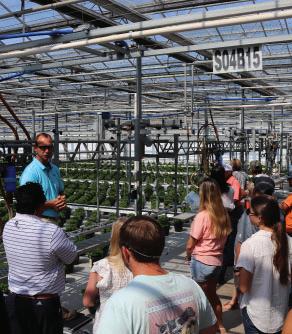
During the week, class participants and their spouses had the opportunity to step out of their familiar farming areas and learn about agriculture in the state of Tennessee. According to the Tennessee Department of Agriculture, more than 80 percent of the state’s land is used for agriculture and forestry, which includes 69,500 farms located on 10.7 million acres.
The class kicked off their time
On day two, PLA attendees toured ThorSport Farm in Murfreesboro, Tennessee. ThorSport Farm is a premier reining and breeding facility located on 500-plus acres featuring an on-site veterinary clinic and surgical center. ThorSport is also home to Tennessee Walking Horses and showcases the breed’s history of success over the years. While there, the PLA received demonstrations from Allison Thorson, who manages the farm and holds 90 world championships in the Tennessee Walking Horse discipline. The class wrapped up their day with a visit to the Tennessee Department of Agriculture, the only state department of agriculture housed on a working farm.
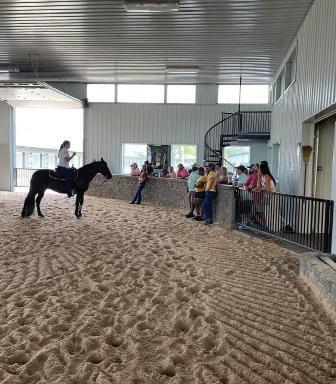
The Peanut Leadership Academy is a cooperative effort between Syngenta Crop Protection, the American Peanut Shellers Association and grower organizations. For more information on the program and to
download a copy of the upcoming Class XIII application, visit www. southernpeanutfarmers.org. Class XIII of the program is scheduled to begin in December 2023.
Brandon Arnold • Golden Peanut Company
Garrett Besler • Wellman, Texas
Matthew Blitch • Statesboro, Ga.
Joe Corcoran • Eufaula, Ala.
Pete Froesse • Trico Peanut
Brian Harrison • Uriah, Ala.
Lance Jackson • Graceville, Fla.
John Layton • Edenton, N.C.
David Leary, Jr. • Unadilla, Ga.
Jeff Lollar • Tokio, Texas
David Martens • Birdsong Peanuts
Chad Mathis • Arlington, Ga.
Drew Monahan • Waverly, Va.
Lehman Nevil • Metter, Ga.
Allison Randell • Premium Peanut
Greg Resmondo • Foley, Ala.
Charles Rogers • Hartsville, S.C.
Jacob Sandeford • Midville, Ga.
Karla Thompson • Thomasville, Ga.
Jason Vinson • Hartford, Ala.
Scott Walker • McDavid, Fla.
Brad Ward • Manteo, N.C.
Caleb Weaver • Olam
Jason Weber • Atmore, Ala.
Russ Worsley • Colquitt, Ga.
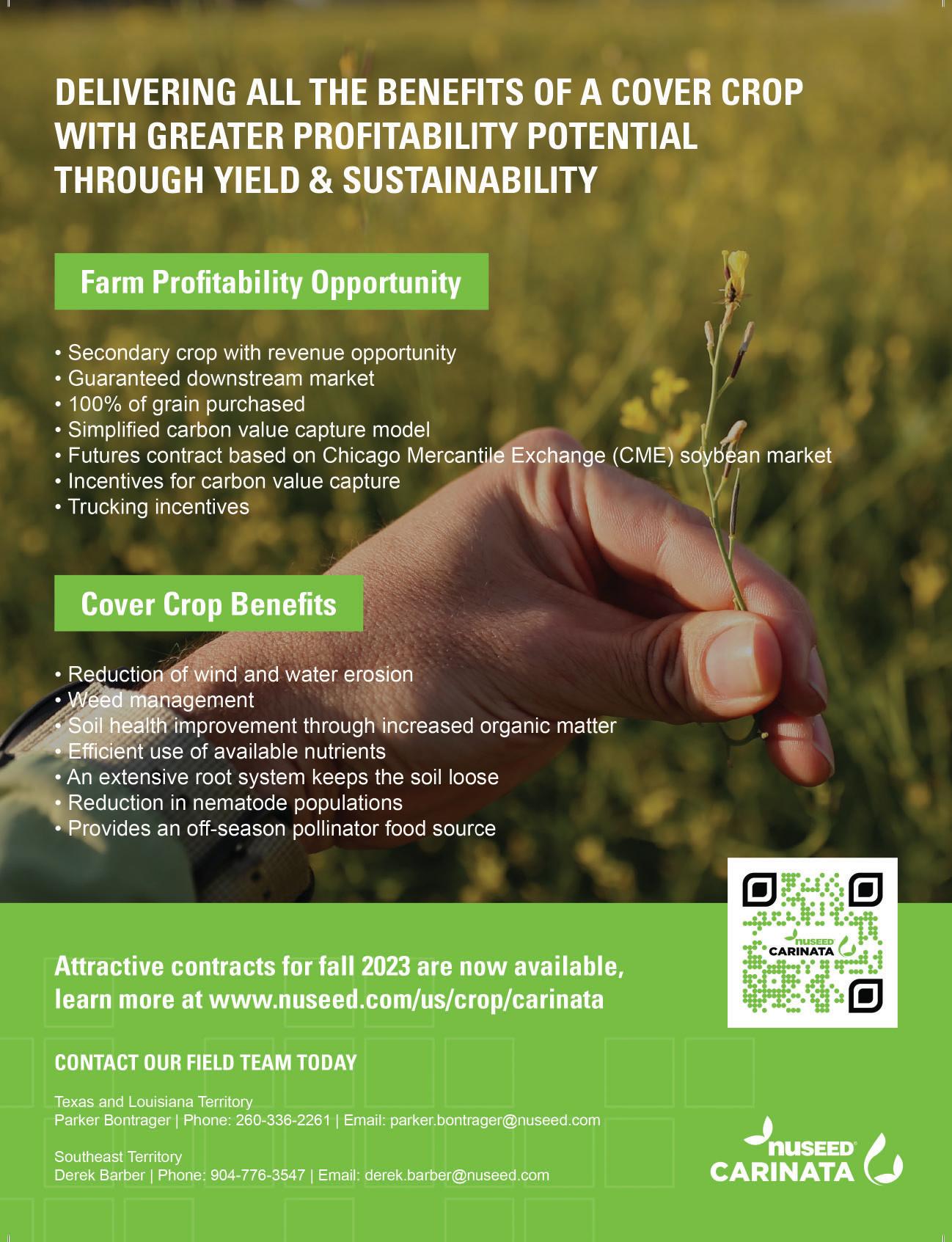
Alabama’s 900-plus peanut farmers have a new champion in their corner. Libbie Johnson joined the Alabama Peanut Producers Association as executive director June 5, 2023.
Johnson hails from Florida Extension, where she gleaned over 20 years of industry experience and built relationships critical to her new role.

"I'm excited to get to know Alabama's peanut producers and understand more about agriculture in Alabama," Johnson says. "I’m thankful to represent such a unique commodity and the hard-working farmers of this state."
As executive director, Johnson will oversee peanut checkoff projects related to research, promotion and education. She'll also work with land-grant universities and farmers on research trials; advocate for the protein-packed legume with decisionmakers in Washington, D.C.; and expand the peanut industry’s footprint in Alabama, in addition to overseeing staff in APPA's Dothan office.
"Libbie is energetic, knowledgeable and talented, and we are excited to see the direction she takes our organization," says APPA President Carl Sanders, who farms in Coffee County. "The board is confident in Libbie's ability to advocate for Alabama peanut farmers and make an impact on our industry."
APPA is an affiliate of the Alabama Farmers Federation, the state's largest farm organization serving
“I'm excited to get to know Alabama's peanut producers and understand more about agriculture in Alabama. I'm thankful to represent such a unique commodity and the hard-working farmers of this state.”
Libbie Johnson Executive Director Alabama Peanut Producers Assn.355,000 member families. Johnson will work closely with the Federation's Governmental & Agricultural Programs (GAP) Department staff serving farmers.
"There's no doubt that Alabama peanut farmers will benefit from Libbie's leadership," says GAP Department Director Mitt Walker. "Libbie's strong skill set uniquely positions her to work with the APPA board, research-focused scientists or high-profile officials in our nation's capital. We are excited to see her lead APPA into a new chapter."
Since 2003, Johnson has served farmers in the Florida Panhandle's Milton and Escambia counties. Areas of expertise include row crops, fruits and vegetables, livestock and natural resources.
Johnson is no stranger to leadership. She’s chaired national Extension-related committees; is past president of the Florida Association
of County Agricultural Agents; and served on the University of Florida Peanut Team and the Sunbelt Ag Expo Team.
She's also a member of Florida Farm Bureau, which named her the Extension Professional of the Year in 2018 and has earned multiple service awards from the National Association of County Agricultural Agents.
Johnson, a Louisiana native, holds bachelor's degrees in political science and plant science from the University of Louisiana at Lafayette, in addition to a master's degree in agroecology from UF.

The thirty-fifth annual Georgia Peanut Tour will be held Sept. 12-14, 2023, in Bainbridge, Georgia, and the surrounding area. The tour brings the latest information on peanuts while giving a firsthand view of industry infrastructure from production and handling to processing and utilization. Tour stops will be made in several peanut producing counties in Southwest Georgia.
Attendees can expect to see first-hand nearly every aspect of peanut production in the state. This year’s tour hosts many exciting stops including on-farm harvest demonstrations and clinics, as well as, research at the University of Georgia Attapulgus Research and Education Center.
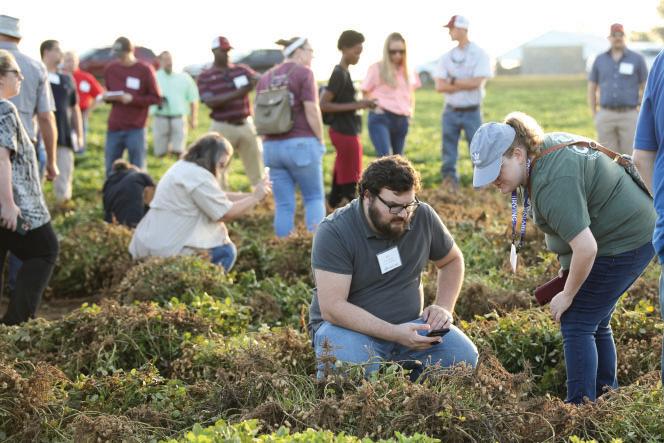
The tour kicks off this year with the Hot Topics Seminar on Sept. 12 at 2:30 p.m. at the Cloud Livestock Pavilion in Bainbridge, Georgia. The seminar topics include an update on the 2023 Georgia peanut crop and a special focus on advancements in integrative precision agriculture for enhanced peanut production and processing.
The Georgia Peanut Commission,

University of Georgia-Tifton Campus and Griffin Campus, and the USDA Agricultural Research Service National Peanut Research Lab coordinate the tour.
Hotel accommodations can be made at the Hampton Inn, Bainbridge, Georgia by calling 229-246-1341. Be sure to ask for the 2023 Georgia Peanut Tour room block when
making a reservation. The room block deadline is Aug. 20, 2023. Additional rooms are available at the Holiday Inn Express in Bainbridge, Georgia.
Visit georgiapeanuttour.com to register and view tour schedule. For more information, contact David West at 229-386-3470 or via email at david@gapeanuts.com
The Georgia Peanut Commission is hosting a photo contest through Oct. 1, 2023, featuring peanut farms from across the state to fill the pages of the 2024 Georgia Peanut Calendar. Photos will also be selected to be used in various promotional projects by GPC throughout the year. Georgia farmers are encouraged to submit their best high-resolution photo from throughout the growing season. Winning entries will be selected for each month of the calendar, as well as the cover page. Below are tips to consider when selecting a photo to enter:
• Make sure the photo is not offensive and avoid photos with large,
easy to read corporate logos.
• Think about the months of the year and select photos that represent them. For example, land prep work in the winter, planting in the spring, irrigation in the summer and harvest in the fall.
• Make sure photos are taken in horizontal format, so they will fill the entire page of the calendar.
• Showcase your family (young and old) and what being a Georgia
peanut farmer means to you.
• Choose a photo you feel helps others understand more about how you care for the crop they love.
Photo entries must be taken during the 2021, 2022 or 2023 peanut crop year and feature peanut production. Entries must also be high resolution (300 dpi), horizontal and not taken with a phone; otherwise, they may be disqualified.
Please submit photos in .jpg format and submit them with the online entry form provided on www. gapeanuts.com by Oct. 1, 2023, for consideration. Winning entries will be entered for a chance to win a Visa gift card. Visit www.gapeanuts.com for complete details


The 27th annual USA Peanut Congress, co-hosted by the American Peanut Council and the American Peanut Shellers Association, was held June 12-15, 2023, in Amelia Island, Florida. During the four-day conference, leaders from all sectors of the peanut industry discussed export markets, sustainability, research and the upcoming peanut crop.
The event started with APC business sessions on June 13, including committee meetings on Sustainability, Export, Aflatoxin, Packaging & Handling, Membership, Peanut Butter for the Hungry, as well as the semi-annual APC board of directors meeting.
The following two days included general sessions around such topics as sustainability and consumer activation, peanut research, 2023 crop update, nutrient dense life and international pesticides, heavy metals and MRL policies. There was also a panel discussion on reaching the Gen Z demographic.
The American Peanut Council presented awards to individuals who have made an impact through the years in service to the peanut industry and in their research focus. The organization presented its prestigious Hall of Fame award and four Lifetime Achievement awards.
Bob Parker received the Hall of Fame award. His career in the peanut industry spans nearly five decades and is marked by exceptional leadership and service in various roles, most recently as President and CEO of the National Peanut Board. He has worked tirelessly to improve the economic condition of U.S. peanut farmers and their families through strategic promotion of the peanut industry and
groundbreaking research in peanut allergy.
"It comes as no surprise Bob Parker is receiving the highest honor the American Peanut Council bestows," says APC chairman-elect Donald Chase. "The significant strides he has made throughout his peanut career will have lasting impacts for years to come."
The APC’s 2023 Lifetime Achievement awards were presented to:
• U.S. Senator Saxby Chambliss, R- Georgia
• George Lovatt, peanut broker, Lovatt and Rushing
• Victor Nwosu, former plant scientist, Mars Wrigley
• Terry Shamblin, former president & CEO, America Peanut Growers Group.
"All of these individuals have provided significant contributions to the U.S. peanut industry, whether through policymaking, market insight, research, or grower-owned shelling," Chase says. "The peanut industry owes them a debt of gratitude."
Sen. Chambliss - A champion of farmers throughout his congressional career, Sen. Chambliss was a key player in the passage of multiple farm
bills and led the fight for the separate peanut payment limit, among other legislative battles that affected peanut growers.
George Lovatt – Lovatt first joined the APC board of directors in 1982. He served in every officer position, including as chair in 1990. He also successfully served as head of the Statistical Task Force for APC to bring accuracy to peanut data collected and distributed by USDA.
Victor Nwosu - Nwosu has worked tirelessly to secure viable peanut varieties and research that would ensure peanut sustainability in the U.S. and throughout the world. He also spearheaded a global scientific community of researchers to deliver the first mapping of the peanut genome.
Terry Shamblin – Under Shamblin’s direction, the America Peanut Growers Group, a shelling facility owned exclusively by peanut growers in southwest Georgia and north Florida, shelled its first crop in 2003 and would become the model grower-owned sheller.
Shyam Tallury, curator of the U.S. Department of Agriculture's germplasm collection in Griffin, Georgia, was presented with APC's top scientific honor, the Peanut Research and Education Award. He received the award for the significant impacts he has made with maintaining the peanut germplasm collection which benefits peanut breeding across the U.S. The Peanut Research and Education Award is sponsored by Bayer CropScience.
"Anyone who has followed the recent developments in peanut genomics and breeding over the last few years knows the importance
of our collection of peanut genetic diversity," says Jack Davis, chair of the Peanut Research Foundation. "USDA maintains a collection of diverse germplasm from around the world including our extremely valuable collection of wild species which harbor many of the desirable genes which will lead to the new improved varieties of the future."
Tallury received his doctorate from North Carolina State University under the direction of Tom Stalker.
After serving as peanut breeder at Clemson University, he took on the responsibility of curator of the USDA germplasm collection in 2015. At that time, the collection was in a state of disarray. Seed in the collection must be regenerated every so many years and many accessions were in dire need of regeneration. Many of the accessions were unnecessary duplicates complicating the curation process.
"Dr. Tallury has done a fantastic
job of getting the collection on a regeneration schedule, cleaning up duplicates and making the collection more usable by the genomic scientists and breeders that depend on it," Davis says. "He has developed an excellent relationship with those using the collection and those users trust that they get what they expect when they request germplasm."
Congratulations to these deserving award winners.

The peanut industry mourns the loss of two industry pioneers in manufacturing and research.
James Carlie Adams II, chairman of AMADAS Industries Inc., passed away June 21, 2023, at home in Suffolk, Virginia.
Adams attended North Carolina State University and studied mechanical engineering. After college, Adams served in the Army National Guard, and joined his uncle Oliver K. Hobbs to found HobbsAdams Engineering Co. in Suffolk, Virginia. Before the business became known internationally for its peanut harvesting equipment, Adams traveled
the Southeast showing the first model Hobbs peanut digger - towed by his Corvette Stingray. Adams went on to travel the globe to develop markets in South America, Africa, and Australia. Hobbs-Adams would grow to become AMADAS Industries and continues to be a world leader in advanced equipment for peanut farmers.
David Wright passed away July 14, 2023, at his home farm in Quincy, Florida. He worked for the University of Florida's North Florida Research and Education Center in Quincy for 45 years, retiring in 2022. He graduated with a doctoral degree in agronomy from Virginia Tech.

Wright led a very active life professionally and on the farm. Professionally, he is regarded by his colleagues and students as a renowned agricultural scientist, esteemed mentor and good friend. He's widely known for venturing into uncharted territories, pioneering and innovating in conservation technology, precision agriculture and livestock management.
He was often ahead of the times in developing long lasting solutions that farmers are still successfully implementing and researchers are continuing to build upon.
The National Peanut Board hosted 30 key school nutrition leaders at its first school nutrition summit, June 26-28, at the Culinary Institute of America in San Antonio, Texas.

This event empowered attendees to discuss challenges and solutions to school nutrition programs across the United States; all in an intimate setting where connections and inspiration could form. While peanut butter is a staple in most school nutrition programs, this time together allowed attendees to think outside of the box and learn how peanuts and peanut butter could be served more often and perhaps be a solution to some of the challenges they face.
"Peanuts are such an incredible asset for school nutrition programs because they’re affordable, accessible, versatile and they taste great," says NPB's Sherry Coleman Collins, MS, RDN, LD. "This summit was a fantastic way to inspire and directly empower school nutrition leaders with the
resources they need to serve peanut products while keeping students with peanut allergies safe."
Topics of the summit included exciting trends like plant-based eating and global flavors, school recipe cooking demonstrations featuring peanuts and educational breakout sessions with actionable advice. Texas peanut grower and graduate of the Peanut Leadership Academy, Lexi Floyd, shared her story in agriculture and discussed her family's farm, how peanuts are grown and the challenges, as well as opportunities in farming.
Peanut allergy management was another important topic covered. One school district in attendance shared how they reintroduced peanut butter after it was banned for a number of years; an encouragement to those who may be faced with a similar challenge. The latest strategies for allergy management in the schools were provided, as well as direction to resources available at
PeanutsinSchools.org. To wrap up the event, attendees divided into teams and participated in a market basket challenge in the Culinary Institute of America kitchens. Here they created practical and nutritious recipes perfect for school meals.


Large and award-winning school districts were represented, which collectively serve thousands of students across the country, including Colorado, Florida, Georgia, Idaho, Oklahoma, Texas and Virginia. Also in attendance were brands, brokers and commercial operators, including Smucker’s and Chartwells K12.
The summit provided key leaders the opportunity to build upon their relationship with NPB as a resource and leave with a sense of excitement, encouragement and enthusiasm as they traveled back to their districts to continue making a difference in the health and lives of children around the country.

The U.S. House Appropriations Committee approved the Agriculture, Rural Development, Food and Drug Administration, and Related Agencies Appropriations bill in a 34 to 27 vote. The legislation provides a total of $25.313 billion for programs under the jurisdiction of the Subcommittee, $532 million (2.1 percent) below the FY23 enacted level and $3.622 billion (12.5 percent) below the FY24 President’s Budget Request.
Included in the bill are peanut provisions proposed by Agriculture Subcommittee Ranking Member Sanford Bishop, D-Georgia, and supported by the peanut industry. These U.S. Peanut Federation supported research initiatives, aflatoxin and nutrition, are in their third year of funding. Total funding for Fiscal Year 2023 was $4 million for aflatoxin research at the U.S.
Department of Agriculture’s Peanut Research Laboratory in Dawson, Georgia, Fort Valley State University and other land grant universities and $1.5 million for the USDA Agricultural Research Service to work on peanut nutrition priorities. ARS has been working with The Peanut Institute on nutrition projects.
For Fiscal Year 2024, total proposed funding is $2 million for peanut nutrition research and $4 million for aflatoxin research. Legislative report language is as follows:
Peanut
The Committee recognizes the need for more research to identify how peanut consumption contributes to overall health and wellness and reduces chronic disease risk in various groups and across the lifespan. The

The Republican Study Committee (RSC) recently released their Fiscal Year 2024 Budget Proposal, entitled "Protecting America's Economic Security." The RSC is a study group of U.S. House Republicans that work toward advancing a conservative legislative agenda. The recently released FY24 budget balances in seven years, cuts spending by $16.3 trillion over 10 years, and reduces taxes by $5.1 Trillion over 10 years.
Notably for the agriculture industry, the budget proposes eliminating the Price Loss Coverage (PLC) and Agriculture Risk Coverage (ARC) programs. According to the proposal, "since these programs are designed to guarantee a certain price of level of revenue, more of the benefits accrue to wealthier farmers with higher levels of sales and revenues. Eliminating these
programs would save taxpayers more than $51.15 billion over 10 years while ensuring that support payments are directed to those that need them."
The proposed budget also includes significant reforms to crop insurance programs. The RSC Budget would adhere to the prior Administration's proposal to reduce the federal share of crop insurance premiums by 14 percent. Additionally, the RSC Budget would halt administrative expense reimbursements to crop insurance companies. The RSC estimates that these two reforms would save taxpayers more than $37.8 billion over the next 10 years. Lastly, the budget proposal would cap the overall amount of crop insurance subsidies a single farmer may receive.
Committee provides an increase of $500,000 to support peanut nutrition research. Research topics should include chronic diseases, nutrition and wellness across the lifespan, health disparities, dietary patterns for optimal health, and nutrition for the future.
Peanut Research
The Committee provides no less than the fiscal year 2023 level to support research activities to mitigate aflatoxin contamination in peanuts. The Committee directs ARS to enhance ongoing collaborations with land-grant institutions to further advance research efforts.
The U.S. House Appropriations Committee is in the process of approving all 12 appropriations bills, which will then go to the full chamber for a vote. Current government funding expires on Oct. 1, 2023.
ce
The U.S. Peanut Federation signed a letter in support of full and adequate funding for the U.S. Codex Office (USCO) in the FY24 Agriculture, Food and Drug Administration, and Related Agencies Appropriations bill. The U.S. Codex Office is housed in the USDA’s Trade and Foreign Agricultural Affairs mission area and conducts international outreach and provides education to promote and support the development of a sustainable global agricultural system and improved international nutrition efforts.
According to the letter, "A lack of financial support for the USCO would hamper our nation’s ability to engage on critical multilateral issues that affect all Americans as well as the greater global population.”
A total of 46 agricultural organizations signed the letter in support of the U.S. Codex Office.
The Congressional Budget Office (CBO) released its updated Baseline for Farm Programs on May 12. This baseline identifies expected outlays for farm program spending over the next 10 years and indicates program spending available to the U.S. Congress as they craft the 2023 Farm Bill.
According to CBO, the 2023 Farm Bill could be the first trillion-dollar Farm Bill, with expected costs of $1.51 trillion over 10 years. This estimate is a $31.5 billion increase over the February 2023 Farm Bill Baseline estimate from CBO. Of this $1.51 trillion, 81.1 percent of the cost will be for the Supplemental Nutrition Assistance Program (SNAP), while the other 18.9 percent will be split between crop insurance, commodity programs, conservation and other programs. Commodity and Related Programs are expected to cost a total of $68.6 billion, just 4.5 percent of total spending.
In comparison, the 2018 Farm Bill was estimated to cost $867 billion at the time of enactment. Overall, 77 percent went to SNAP, nine percent to crop insurance, seven percent to conservation and seven percent to commodity programs.
The May 2023 CBO baseline is widely expected to be the 2023 Farm Bill scoring baseline – meaning any proposed policy modifications and the impact on the U.S. deficit will be measured against this baseline. According to U.S. Senate Agriculture Committee Chairwoman Debbie Stabenow, there is no new money for the upcoming Farm Bill, meaning any funding increases for programs are going to require taking money from somewhere else in the bill.
In comments to reporters, Chairwoman Stabenow stated, "we have the baseline, but that's it. We have been asking both in the House and Senate for additional dollars from the Budget Committee. Even a few
billion more would have been very helpful. But instead, we really lost all the flexibility that we thought we had."
In a May 7 editorial for the Washington Post titled, "Without the Farm Bill, Very Few American Farmers Could Survive," U.S. Senate Agriculture Ranking Member John Boozman voiced support for protecting the farm bill's risk management tools.
Senator Boozman stated, "The average Agriculture Department loan recipient will borrow $300,000 annually to raise crops or livestock for an average rate of return of less than 2 percent — a proposition few would accept. Add in geopolitical risks, pandemics, natural disasters, labor shortages and stagnant trade opportunities, and the value proposition feels dismal, underscoring the importance of the farm safety net for those who feed, fuel, and clothe everyone in the United States."
The House Committee on Agriculture Chairman Glenn “GT” Thompson (PA-15) and Ranking Member David Scott (GA-13) released the following joint statement after announcing the formation of the bipartisan Agricultural Labor Working Group, focusing on the workforce issues faced by the nation's agricultural producers:
“The Committee on Agriculture has heard loud and clear from producers across the nation that one of the biggest challenges confronting the agriculture industry is a lack of reliable labor. Though not directly in our committee’s jurisdiction, we have a responsibility to be a voice in Congress on the issues and policies impacting farmers and ranchers. This is a complex problem that deserves the focused attention of the Members who hear from producers every day rather than the partisan grandstanding that has plagued these efforts in the past.”
Members of the working group have been selected from current Committee members and aim to represent every sector and geographical region of American agriculture.
Congressmen Rick Crawford (AR01) and Don Davis (NC-01) will co-chair the working group. The working group will:
• Seek input from stakeholders, employers, and workers, particularly emphasizing the H-2A visa program for nonimmigrant agricultural workers;
• Produce an interim report detailing the program's shortcomings and the impacts on food security, and;
• File a final report with recommendations to address the flaws within the program.
Republicans
Rep. Rick Crawford, Co-Chair (AR-01)
Rep. Lori Chavez-DeRemer (OR-05)
Rep. Monica De La Cruz (TX-15)
Rep. Doug LaMalfa (CA-01)
Rep. Nick Langworthy (NY-23)
Rep. David Rouzer (NC-07)
Rep. Derrick Van Orden (WI-03)
Democrats:
Rep. Don Davis, Co-Chair (NC-01)
Rep. Yadira Caraveo (CO-08)
Rep. Salud Carbajal (CA-24)
Rep. Jim Costa (CA-21)
Rep. Jasmine Crockett (TX-30)
Rep. Darren Soto (FL-09)
Rep. Gabe Vasquez (NM-02)
Just in time for the July 4th holiday weekend, life-long grilling aficionado Courtney Rada shared her tips to wow summer backyard party guests! Her favorite secret ingredient – peanuts and peanut butter!

SPG worked with A-1 Broadcast and Courtney Rada, host of TV Food Network’s "Carnivorous" to put peanuts and peanut butter front and center on television stations nationwide. Courtney showed how peanuts and peanut butter take your coleslaw up a notch with an Asian Peanut Slaw. She claims peanut butter is the secret ingredient you never knew you were missing on a burger.
"The creamy nuttiness of the peanut butter, with some sweet and tart jelly, and the heat from some fresh slices of jalapeno combines for an absolutely delicious burger," Rada says. She likes to round off the meal with some peanut butter saltine brittle.
Rada did 27 live television and radio interviews for four hours on June 29 promoting peanuts and peanut butter, Stella Rosa Wines, and Sprouts Farmers Market for successful outdoor entertaining and grilling.
The final tour numbers should surpass 3 million impressions and 70 million potentially reached online.
Southern Peanut Growers exhibited at the Georgia Chapter of the American Academy of Pediatrics Annual Meeting, June 16-17 in Amelia Island, Florida. Leslie Wagner, SPG executive director, spoke to nearly every pediatrician in attendance focusing on early introduction to prevent peanut allergy and the newest Dietary Guidelines for Americans. SPG also provided the newest information from the National Peanut Board on managing food allergies in schools.
This year’s meeting continued last year’s trend of more pediatricians from outside the state of Georgia attending, which helps extend the peanut industry's reach with the early introduction message.

During the meeting, doctors
Leslie Wagner, Southern Peanut Growers, and Maddie Frost, Georgia Peanut Commission, exhibited at the Family, Consumer and Community Leaders of America’s (FCCLA) national conference in Denver, Colorado, July 2–4, 2023. FCCLA is a Career and Technical Student Organization that functions as an integral part of the Family and Consumer Sciences education curriculum. There were nearly 8,000 people—students, teachers, advisors and parents—from across the United States at this year’s meeting.

SPG has new curriculum developed specifically for career and technical courses including culinary, food and nutrition sciences, and early childhood development as well as a PB Kit order form. SPG's booth in the exhibit hall stayed busy and the Whova app allowed attendees to check-in and communicate with exhibitors before and during the conference so that exhibitors could continue to provide materials attendees need for their individual programs.
placed orders for the handouts and copies of the poster to be sent to their offices so they can distribute to patients at the appropriate visit.
Leslie Wagner, executive director of Southern Peanut Growers, participated in the Virginia Association for Teachers of Family and Consumer Sciences' Hall of Fame Best Resources on July 19 in Harrisonburg, Virginia. There were 125 teachers in attendance to get curriculum and resources for Food and Nutrition Sciences, Early Childhood Development and Culinary classes. This meeting is designed to help teachers prepare for the upcoming school year and to recognize outstanding teachers and outstanding education resources.

